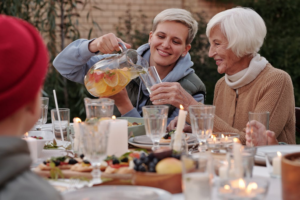Caregivers’ Tips to Cope With Dementia and Alcohol Abuse
Giving proper care for your loved one with dementia can be challenging, and it’s even tougher when they also struggle with alcohol abuse. Sure, you have the option to take them to memory care in Houston, but you choose to take care of them, and it’s completely okay and awesome. As a caregiver, you need to do your best so that your loved one gets the best care possible while keeping yourself emotionally resilient throughout the process.
But how do you cope with both issues at once? In this blog post, we’ll cover some tips for caregivers on managing dementia and alcohol abuse in their loved ones. From getting rid of any alcohol sources in the environment to learning how to protect yourself as a caregiver, these tips will aid you in navigating through this difficult journey. Let’s get the guide started.
Get Rid of Any Alcohol From the Environment, Including Those “Innocent” Sources

The first step in managing alcohol abuse and dementia is to get rid of any sources of alcohol from the environment. Though it may seem like a clear surefire way, sometimes caregivers overlook innocent-looking sources such as mouthwash or cough syrup. Even though these products might not contain a significant amount of alcohol, they can still trigger your loved one’s addiction and cause them to relapse. Therefore, it’s best to switch to non-alcoholic substitutes whenever possible.
In short, remove all alcoholic beverages from your home. If they’ve been struggling with alcohol abuse for a while, there’s a good chance that they have developed some stash around the house. Doing this will also help reduce temptation and ensure your loved one walks on the right track with their recovery journey.
Find the Triggers and Address Them
The reasons behind alcohol abuse are always there, waiting for us to uncover and address. This is even real if your loved one is also an alcoholic. So start identifying the triggers that lead them to drink.
The first step in addressing these triggers is observation. Pay attention to your loved one’s behavior and note what seems to trigger their desire for alcohol. After the identification, you can then work on addressing them, such as through distraction techniques and creating the safe environment we mentioned.
Go for Non-Alcohol Substitutes
 Going for non-alcohol substitutes is also a great way to cope with dementia and alcohol abuse. When we talk about substitutes, it doesn’t mean you need to compromise on the taste or fun of drinking. Instead, plenty of delicious and refreshing non-alcoholic drinks are available in the market.
Going for non-alcohol substitutes is also a great way to cope with dementia and alcohol abuse. When we talk about substitutes, it doesn’t mean you need to compromise on the taste or fun of drinking. Instead, plenty of delicious and refreshing non-alcoholic drinks are available in the market.
One of the most popular non-alcoholic substitutes is mocktails. These drinks come in various flavors and styles, such as fruity, fizzy, or creamy. They contain fresh fruits and juices which can be enjoyed without any guilt or harm. But you can always go for healthier beverages such as herbal teas and infusions which provide soothing effects on both mind and body. They not only help reduce stress levels but also improve sleep quality.
Learn How to Protect Yourself as a Caregiver
Giving proper care for someone with dementia can be emotionally and physically draining for the caregiver, let alone if they’re also an alcoholic. Protecting yourself as a caregiver is a must to avoid burnout or stress-related illnesses. But how? Start with joining support groups that can connect with other caregivers on the same road.
Secondly, establish boundaries between your personal life and caregiving responsibilities. Make time for fun activities which bring you joy and a sense of motivation to keep sane. This will reduce feelings of resentment towards the person you’re taking care of. Seek professional help if needed. Therapy sessions can provide a safe space to discuss any emotional challenges related to being a caregiver.
Caring for someone with dementia and alcohol abuse can be a challenging task. It requires patience, understanding, and compassion. But by following these tips, caregivers can make the journey a little easier.…

